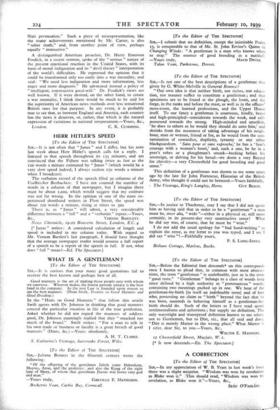[To the Editor of THE SPECTATOR] S1R,—IS not one of
the best descriptions of a gentleman that given by G. White-Melville in General Bounce?
"Our own idea is that neither birth, nor riches, nor educa- tion, nor manner suffice to constitute a gentleman ; and that specimens are to be found at the plough, the loom, and the forge, in the ranks and before the mast, as well as in the officers' mess-room, the learned professions, and the Upper House itself. To our fancy a gentleman is courteous, kindly, brave and high-principled—considerate towards the weak, and self- possessed towards the strong: High-minded and unselfish, 'he does to others as he would they should do unto him,' and shrinks from the meanness of taking advantage of his neigh- bour, man or woman, friend or foe, as he would from the con- tamination of cowardice, duplicity, tyranny or any other blackguardism. 'Sans peur et sans reproche,' he has a 'lion's courage with a woman's heart,' and, such a one, be he in a peer's robes or a ploughman's smock—becking before his sovereign, or delving for his bread—we deem a very Bayard for chivalry—a very Chesterfield for good breeding and good sense."
This definition of a gentleman was shown to me some years ago by the late Sir John Fortescue, Historian of the British Army, who thought it could not be bettered.—Yours faithfully,
• The Vicarage, King's Langley, Herts. GUY BEECH.














































 Previous page
Previous page